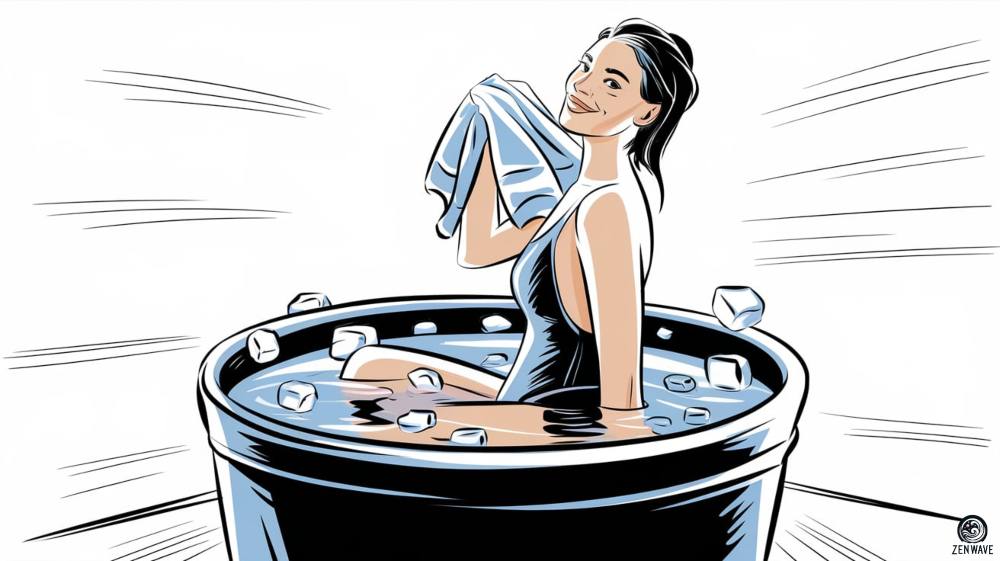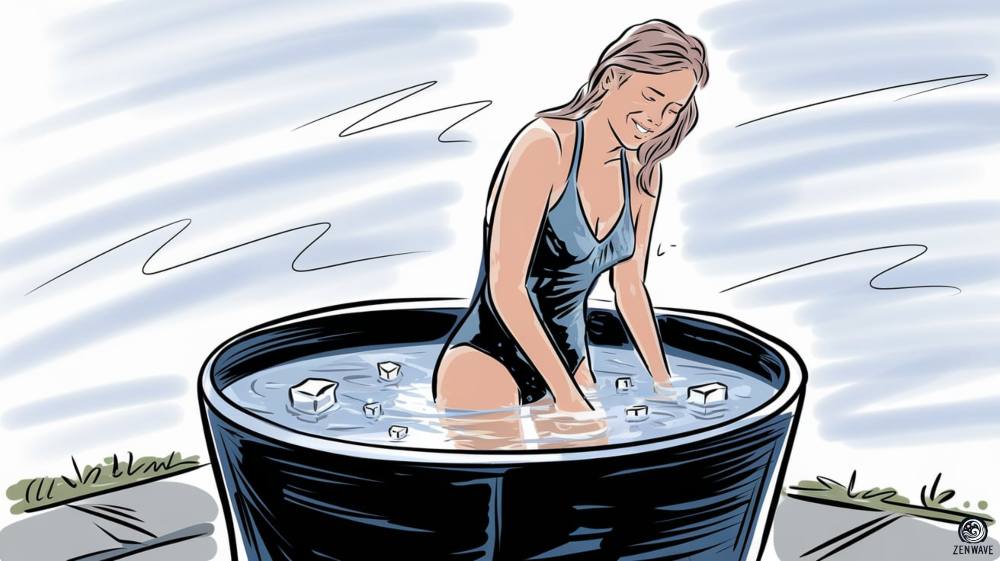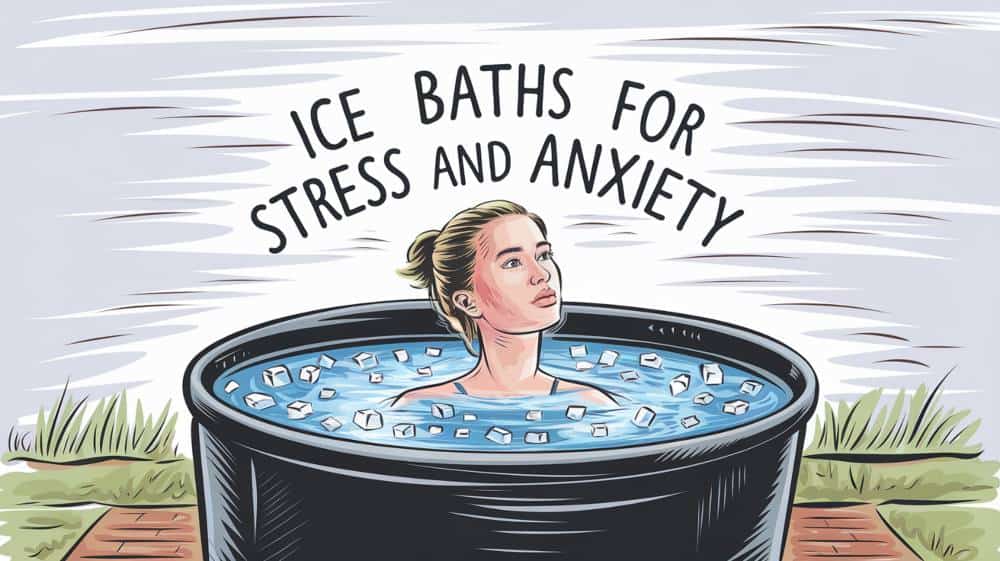Stress and anxiety are universal human experiences. We all face them at some point in our lives, whether it’s from work pressures, personal relationships, or the general uncertainties of life. While everyone deals with these challenges, some people find it harder to manage their stress and anxiety effectively. The search for relief can be frustrating and overwhelming.
Researchers have been exploring various natural methods to help combat stress and anxiety. Recently, ice baths and other forms of cold exposure are an approach that is gaining attention. While many people have doubts, there’s growing evidence to suggest that cold water immersion could be a valuable tool in managing stress and anxiety.
This article delves into the science behind ice baths and the ways they have been shown promise. We’ll explore how they might help reduce inflammation, boost mood-enhancing chemicals in our brains, and even improve our memory and overall mood. While ice baths shouldn’t replace professional medical advice or treatment, let’s look at how it may be a natural way to support your mental well-being.
Benefits of Ice Baths For Stress and Anxiety

1. Reduced Inflammation
Scientists have discovered an interesting relationship between inflammation and stress. Research shows that inflammation, stress, and anxiety are closely linked in a two-way relationship:
- Inflammation can cause stress and anxiety.
- Stress and anxiety can also cause inflammation.
This means that when our body is inflamed, we might feel more stressed or anxious. But it also means that when we’re stressed or anxious, our body might become more inflamed. It’s like a cycle that can feed itself.
Cold exposure, or ice baths, have been shown to reduce markers that indicate inflammation. The main inflammatory markers that were reduced by cold exposure were: Creatine kinase, Interleukin-6, and C-reactive protein. When these markers go down, it is assumed there’s less inflammation in the body. There is an interesting study that shows ice baths can lower inflammation in our bodies, especially after exercise.
When researchers compared several different types of recovery methods here is what they discovered about cold exposure:
- Cold exposure, like ice baths, was one of the best methods to lower levels of inflammatory markers in the blood.
- Cold exposure helped decrease muscle soreness and fatigue.
- It may be even more effect if combined with massage therapy.
Reduced inflammation is one of the primary things that draws people to ice baths, be sure to check out our guide on all the benefits of ice baths for even more.
2. Norepinephrine Stimulation
Ice baths might help reduce stress and anxiety by boosting a chemical in our body called norepinephrine. This chemical is important for how our body handles stressful situtations.
A study looked at how cold water affects our bodies. It lasted 12 weeks and involved women doing cold water exposure three times every week.
The main thing they found was that cold water keeps making the body produce more norepinephrine. This increase in norepinephrine might help explain why cold water can make people feel less pain.
Norepinephrine can act like a natural painkiller in our body. By taking regular ice baths and increasing this chemical, people might feel less physical pain and the stress that often comes with it.
Also, having more norepinephrine might help improve mood and lower anxiety. This chemical helps us pay attention and stay alert. The boost from ice baths could help people feel more ready to deal with stressful situations.
3. Memory and Mood Enhancement

Ice baths might help improve memory and mood, which could be beneficial for managing stress and anxiety. A controlled study looked at how regular cold water exposure affects people over time.
The study involved participants in cold water regularly for four months. Here’s what they found:
- Tension decreased significantly in the participants.
- Fatigue levels went down, leaving participants feeling more energized.
- Memory function improved, with participants showing better recall and cognitive performance.
- Negative mood states were reduced, leading to a more positive outlook.
After four months, the participants reported feeling more energetic, active, and brisk compared to those who didn’t practice this cold therapy. These improvements were consistent throughout the study period, suggesting that the benefits of cold water exposure may be cumulative over time.
4. Increased Dopamine
Ice baths might help manage stress and anxiety by increasing dopamine levels in our body. Dopamine is a chemical in our brain that plays a crucial role in how we feel pleasure and motivation.
Research on dopamine is important for stress management. Here’s how it helps:
- Dopamine helps regulate our body’s stress response.
- It can also improve our mood and motivation.
- Higher dopamine levels may help us cope better with stressful situations.
A recent study on cold water immersion found some exciting results about how ice baths affect our brains. This study, done on a group of men, showed that ice baths can increase dopamine levels by up to 250%. Dopamine is a chemical in our brain that makes us feel good and motivated.
In the study, the men got into cold water for a set amount of time. The researchers measured their dopamine levels before, during, and after the ice bath. What they found was pretty amazing.
The men’s dopamine levels shot up to 250% higher than normal. It’s much more than what we usually see from other natural ways of boosting dopamine. This suggests that ice baths might be a really powerful way to increase dopamine in our brains.
Why does this matter? Well, dopamine is super important for how we feel and act. It helps us feel pleasure, stay focused, and keep motivated. When we’re stressed or anxious, we often have low levels of dopamine. This can make us feel tired and unmotivated.
See our guide on the other benefits of ice baths for mental health for more ideas on how cold exposure can be used to help.
Other Ice Bath Benefits That May Help With Stress & Anxiety

Ice baths may also help by:
- Stimulating our body and mind, through the release of hormones that, in controlled amounts, can have positive effects.
- Releasing endorphins, which are natural mood boosters.
- Improving circulation, which can enhance overall brain function.
- Creating a sense of accomplishment, boosting self-esteem and resilience.
- Promoting mindfulness, as the intense sensation of cold water that can anchor and privide a reset.
All these benefits can add up to help fight stress and in anxiety in two ways:
- Quick relief: The sudden boost might help you feel better right away when you’re really stressed.
- Long-term help: If you take ice baths regularly, it might help provide more balance over time.
Ice baths shouldn’t replace other treatments for stress or anxiety, but they might be a helpful addition to a mental health care routine. If you’re considering trying cold water therapy, it’s advisable to start slowly and consult with a healthcare professional, especially if you have any pre-existing health conditions.
Final Thoughts
The research on ice baths for stress and anxiety management shows promise, offering a potential natural tool for mental well-being. From reducing inflammation to boosting dopamine levels, cold water immersion may help alleviate stress and anxiety through multiple pathways.
However, it’s crucial to remember that everyone’s experience with stress and anxiety is unique. If you’re interested in trying ice baths, start slowly and consult with a healthcare professional, especially if you have any pre-existing conditions.
For those looking to explore ice baths conveniently, the Zenwave Ice Pod offers an affordable starting point. As with any new health practice, listen to your body and adjust according to your comfort level. Ice baths could be one part of a broader strategy that includes other proven methods for managing stress and anxiety.

